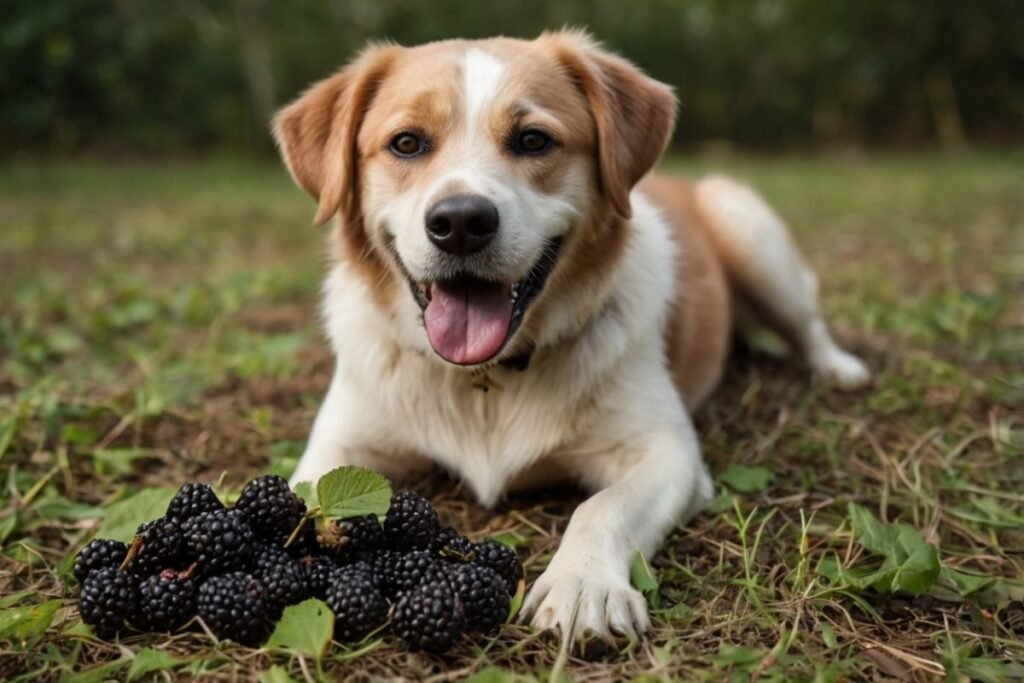Every dog parent faces this moment. You’re holding something delicious, and your beloved companion is watching with hopeful eyes. Today, let’s talk about one of summer’s most tempting treats: blackberries.
These tiny, dark purple gems are bursting with flavor and nutrients. They’re sweet, juicy, and absolutely irresistible. Furthermore, they’re one of nature’s most powerful superfoods for humans.
But what about our four-legged family members? Can we safely share these delightful berries with our dogs? Moreover, should we even consider it?
The answer might surprise you. Yes, dogs can absolutely enjoy blackberries! However, like most things in life, there are important guidelines to follow.
As someone who’s spent years caring for furry companions, I know how much we want to include our pets in every aspect of our lives. We share our homes, our hearts, and yes, sometimes our snacks too. Nevertheless, our dogs’ safety must always come first.
That’s exactly why I’ve put together this comprehensive guide. We’ll explore everything you need to know about dogs and blackberries. Additionally, we’ll cover the science behind why these berries can be beneficial, proper serving methods, and important safety considerations.
By the time you finish reading, you’ll have all the knowledge needed to make informed decisions about sharing this healthy treat with your pup. Furthermore, you’ll discover creative ways to incorporate blackberries into your dog’s routine safely and enjoyably.

Table of Contents
The Simple Answer: Yes, But With Guidelines
Let’s start with the basics. Dogs can absolutely eat blackberries safely. In fact, these little purple powerhouses offer several health benefits for our canine companions.
However, like most good things in life, moderation is key. Blackberries should be an occasional treat, not a daily staple. Think of them as the cherry on top of your dog’s regular, balanced diet.
Most veterinarians agree that blackberries are safe for dogs. Nevertheless, every dog is unique. Some pups might have sensitive stomachs. Others might react differently to new foods.
The key is starting slowly and watching for any reactions. Furthermore, it’s always wise to consult your vet before introducing new treats, especially if your dog has health issues.
Also read, Can Dogs Eat Raspberries?
Why Blackberries Are Actually Great for Dogs
Blackberries aren’t just safe for dogs – they’re actually pretty amazing! These tiny fruits pack a serious nutritional punch. Let’s break down why they’re so beneficial.
Antioxidant Powerhouses
First and foremost, blackberries are loaded with antioxidants. These natural compounds fight free radicals in your dog’s body. Additionally, they help reduce inflammation and support overall health.
Think of antioxidants as tiny superheroes. They patrol your dog’s system, fighting off harmful substances. Moreover, they help keep cells healthy and functioning properly.
Vitamin C for Immune Support
Blackberries contain plenty of vitamin C. This essential vitamin boosts your dog’s immune system. Furthermore, it helps their body fight off infections and illnesses.
Unlike humans, dogs can actually make their own vitamin C. However, extra vitamin C from natural sources like blackberries can still be beneficial. It’s like giving their immune system a gentle, natural boost.
Fiber for Digestive Health
These berries are also rich in fiber. Fiber helps keep your dog’s digestive system running smoothly. Additionally, it can help with both constipation and loose stools.
Proper fiber intake supports healthy gut bacteria too. This means better overall digestion and nutrient absorption. Furthermore, it can help your dog feel fuller and more satisfied.
Low-Calorie Treat Option
Blackberries are naturally low in calories. This makes them an excellent choice for dogs who need to watch their weight. Moreover, they satisfy that desire for something sweet without adding too many calories.
Compared to many commercial dog treats, blackberries are much lower in calories. They’re also free from artificial additives and preservatives. This means you’re giving your dog a pure, natural snack.
Essential Vitamins and Minerals
Blackberries contain several important vitamins and minerals. Vitamin K supports proper blood clotting. Manganese helps with bone health and metabolism. Additionally, vitamin A supports eye health and immune function.
These nutrients work together to support your dog’s overall wellbeing. Furthermore, they complement the nutrients in your dog’s regular food beautifully.
Understanding the Nutritional Profile
Let’s take a closer look at what makes blackberries so nutritionally impressive. Understanding these details helps you make informed decisions about your dog’s treats.
Macronutrient Breakdown
Blackberries are primarily carbohydrates, but they’re the good kind. Most of these carbs come from natural sugars and fiber. Additionally, they contain small amounts of protein and virtually no fat.
The natural sugars in blackberries are much gentler than processed sugars. They don’t cause the same blood sugar spikes. Moreover, the fiber helps slow down sugar absorption.
Micronutrient Density
These berries are incredibly dense in micronutrients. They contain folate, which supports cell function. Additionally, they provide potassium for heart health and muscle function.
The vitamin E in blackberries acts as another antioxidant. It works alongside vitamin C to protect cells. Furthermore, it supports skin and coat health in dogs.
Water Content Benefits
Blackberries have high water content, which is great for hydration. This is especially beneficial during hot summer months. Additionally, the extra water can help support kidney function.
Many dogs don’t drink enough water daily. Therefore, water-rich treats like blackberries can help supplement their fluid intake naturally.
The Xylitol Question: Separating Fact from Fiction
You might have heard that blackberries contain xylitol. This artificial sweetener is extremely toxic to dogs. However, let’s clear up some confusion about this topic.
Natural vs. Artificial Xylitol
Blackberries do contain tiny amounts of naturally occurring xylitol. Nevertheless, this is very different from artificial xylitol found in sugar-free products.
The natural xylitol in blackberries exists in trace amounts. Your dog would need to eat massive quantities to reach dangerous levels. We’re talking pounds and pounds of berries.
Putting Risk in Perspective
To put this in perspective, a dog would need to eat their body weight in blackberries to consume dangerous amounts of natural xylitol. This is practically impossible. Furthermore, they’d likely get sick from overeating long before reaching toxic levels.
However, this doesn’t mean you should ignore portion control. Moderation is still important for other reasons. Additionally, every dog’s sensitivity can vary slightly.
When to Be Concerned
The real xylitol danger comes from processed foods and sugar-free products. These contain concentrated, artificial xylitol. Therefore, never give your dog sugar-free gum, candy, or baked goods.
Always read labels carefully. Moreover, keep all xylitol-containing products safely away from your pets. The artificial version is the real threat, not the tiny amounts in fresh fruits.
Perfect Portions: How Much is Just Right?
Determining the right amount of blackberries for your dog depends on several factors. Size, weight, and individual sensitivity all play important roles.
Size-Based Guidelines
Small dogs under 20 pounds should stick to 1-2 blackberries per serving. Their tiny digestive systems can’t handle large amounts of any new food. Additionally, they’re more prone to stomach upset from overindulgence.
Medium dogs between 20-50 pounds can safely enjoy 2-4 blackberries. This provides benefits without overwhelming their digestive system. Furthermore, it’s enough to satisfy their curiosity about your snack.
Large dogs over 50 pounds can handle 4-6 blackberries per serving. However, even big dogs should stick to these moderate portions. Additionally, remember that treats should never exceed 10% of their daily calories.
Frequency Matters Too
Even with proper portions, frequency is crucial. Blackberries should be an occasional treat, not a daily occurrence. Think once or twice per week at most.
This frequency allows your dog to enjoy the benefits without any digestive upset. Moreover, it keeps blackberries special and exciting for your pup.
Individual Considerations
Some dogs have more sensitive stomachs than others. Therefore, you might need to adjust portions based on your dog’s individual tolerance.
Senior dogs might need smaller portions due to slower digestion. Additionally, puppies should get even tinier amounts until their systems mature.
Dogs with diabetes or weight issues might need to avoid fruit treats altogether. Furthermore, always consult your vet about treats if your dog has health conditions.
Safe Preparation and Serving Methods
Preparing blackberries properly ensures your dog gets maximum benefits safely. Let’s explore the best methods for serving these tasty treats.
Washing is Essential
Always wash blackberries thoroughly before serving them to your dog. Fresh berries can carry pesticides, dirt, or bacteria. Additionally, proper washing removes any potential contaminants.
Use cool, running water to rinse the berries gently. Don’t use soap or produce washes. Furthermore, pat them dry with a clean towel afterward.
Fresh vs. Frozen Options
Both fresh and frozen blackberries are safe for dogs. Fresh berries offer the best texture and flavor. However, frozen berries can be refreshing summer treats.
Frozen berries also last longer in your freezer. Additionally, they can provide soothing relief for teething puppies. Just make sure they’re plain frozen berries without added sugars or syrups.
Avoid Processed Products
Never give your dog blackberry jam, pie, or other processed products. These contain added sugars, artificial sweeteners, and other ingredients that aren’t safe for dogs.
Dried blackberries often contain added sugar too. Therefore, stick to fresh or plain frozen berries only. Additionally, avoid any products with artificial flavors or preservatives.
Creative Serving Ideas
You can serve blackberries plain as simple treats. However, there are creative ways to make them even more special for your pup.
Mash a few berries and mix them into your dog’s regular food. This adds flavor and nutrition to their meal. Furthermore, it helps distribute the fruit throughout their diet.
Freeze berries in ice cube trays with a little water. This creates refreshing summer treats. Additionally, you can stuff them into puzzle toys for mental stimulation.
Special Considerations for Puppies

Puppies can eat blackberries, but they need extra care and consideration. Their developing digestive systems are more sensitive than adult dogs.
Age Matters
Puppies under 8 weeks should only eat their mother’s milk or approved puppy formula. Their digestive systems aren’t ready for solid foods yet. Additionally, any treats could cause serious stomach upset.
Puppies between 8-12 weeks can try tiny amounts of blackberries. Start with just half a berry. Moreover, watch closely for any reactions over the next 24 hours.
Smaller Portions
Even older puppies need much smaller portions than adult dogs. One small berry is plenty for most puppies. Additionally, limit treats to once per week until they’re fully grown.
Remember that puppies get most of their nutrition from puppy food. Therefore, treats should be minimal and infrequent. Furthermore, too many treats can upset their nutritional balance.
Monitoring is Crucial
Watch puppies extra carefully after giving them any new food. Their symptoms can develop faster than in adult dogs. Additionally, they can become dehydrated more quickly if they have digestive upset.
If your puppy shows any signs of illness after eating blackberries, contact your vet immediately. Furthermore, don’t give them any more fruit treats until you get professional advice.
Recognizing and Managing Overindulgence
Sometimes dogs get into things they shouldn’t. Maybe your pup found your berry bowl when you weren’t watching. Here’s what to do if your dog eats too many blackberries.
Common Symptoms
The most common sign of blackberry overindulgence is digestive upset. Your dog might have loose stools or diarrhea. Additionally, they might experience gas or bloating.
Some dogs might vomit if they’ve eaten too many berries. Furthermore, they might seem less energetic than usual. These symptoms typically develop within a few hours of eating.
When to Worry
Most dogs will recover from eating too many blackberries on their own. However, watch for signs that require veterinary attention.
Persistent vomiting or diarrhea lasting more than 24 hours needs professional care. Additionally, if your dog seems very lethargic or won’t drink water, call your vet.
Signs of severe dehydration include dry gums, sunken eyes, and loss of skin elasticity. Furthermore, if your dog’s symptoms seem to be getting worse instead of better, seek help immediately.
Home Management
For mild symptoms, withhold food for 12-24 hours while providing plenty of fresh water. This gives their digestive system time to settle. Additionally, bland foods like boiled chicken and rice can help when you reintroduce food.
Monitor your dog closely during recovery. Furthermore, keep them comfortable and quiet while they heal.
Alternative Fruit Options for Variety
While blackberries are great, variety keeps things interesting for your dog. Here are other safe fruit options to rotate into their treat repertoire.
Berry Family Alternatives
Blueberries are another excellent choice for dogs. They’re even smaller than blackberries, making them perfect for tiny dogs. Additionally, they’re packed with similar antioxidants and vitamins.
Raspberries are safe in small amounts too. However, they contain slightly more natural xylitol than blackberries. Therefore, give even smaller portions of raspberries.
Strawberries make wonderful occasional treats. Remove the green tops first. Additionally, cut large strawberries into smaller pieces for safety.
Other Safe Fruits
Apples are classic dog treats, but remove all seeds first. Apple seeds contain cyanide compounds that are toxic to dogs. Furthermore, cut apples into appropriate-sized pieces.
Bananas are soft and easy to digest. They’re also high in potassium and fiber. However, they’re higher in sugar than berries, so use even smaller portions.
Watermelon is refreshing and hydrating. Remove all seeds and rind first. Additionally, the high water content makes it perfect for hot summer days.
Fruits to Always Avoid
Never give your dog grapes or raisins. These are extremely toxic and can cause kidney failure. Additionally, even small amounts can be dangerous.
Cherries contain pits that pose choking hazards. Furthermore, the pits contain cyanide compounds. Therefore, cherries are best avoided entirely.
Citrus fruits are too acidic for most dogs. They can cause stomach upset and digestive issues. Additionally, the oils in citrus peels can be toxic.
Creative Blackberry Treat Recipes
Making homemade treats with blackberries can be fun and rewarding. Here are some simple, dog-safe recipes to try.
Frozen Yogurt Berry Bites
Mix plain, unsweetened Greek yogurt with mashed blackberries. Use about 1 cup of yogurt to 1/4 cup of berries. Additionally, make sure the yogurt doesn’t contain artificial sweeteners.
Pour the mixture into ice cube trays or silicone molds. Freeze overnight until solid. Furthermore, these treats can last several weeks in the freezer.
Serve one cube at a time as a special treat. Additionally, these are perfect for hot summer days when your dog needs cooling relief.
Berry and Banana Mash
Mash 2-3 blackberries with a few slices of banana. This creates a naturally sweet mixture that most dogs love. Additionally, the banana adds extra potassium and fiber.
Serve a small spoonful mixed into their regular food. Furthermore, you can freeze small portions in ice cube trays for later use.
This combination is especially good for dogs who need extra fiber in their diet. Additionally, it’s gentle on sensitive stomachs.
Blackberry Popsicles
Blend a few blackberries with plain water to create a smooth puree. Pour into popsicle molds or ice cube trays. Additionally, you can add a small amount of plain yogurt for creaminess.
These frozen treats are perfect for teething puppies. Furthermore, they provide mental stimulation as dogs work to eat them.
Make sure the treats are appropriately sized for your dog. Additionally, supervise your dog while they enjoy frozen treats to prevent choking.
Health Benefits Beyond Basic Nutrition
Blackberries offer several health benefits that go beyond basic nutrition. Understanding these can help you appreciate why they’re such great treats for dogs.
Anti-Inflammatory Properties
The antioxidants in blackberries have natural anti-inflammatory effects. This can help dogs with arthritis or joint pain. Additionally, reduced inflammation supports overall health and longevity.
Chronic inflammation contributes to many age-related diseases. Therefore, foods with anti-inflammatory properties can be protective. Furthermore, natural sources are generally safer than supplements.
Cognitive Support
Some studies suggest that berries may support brain health and cognitive function. The antioxidants may help protect brain cells from damage. Additionally, they might support memory and learning.
While research in dogs is limited, the compounds that benefit human brains likely help dogs too. Furthermore, any food that supports overall health will benefit the brain indirectly.
Heart Health Benefits
The potassium in blackberries supports heart health and proper muscle function. Additionally, the fiber can help maintain healthy cholesterol levels.
Good cardiovascular health is crucial for dogs of all ages. Furthermore, natural sources of heart-healthy nutrients are always preferable to synthetic supplements.
When to Consult Your Veterinarian
While blackberries are generally safe, certain situations require professional guidance. Knowing when to consult your vet can prevent problems.
Pre-existing Health Conditions
Dogs with diabetes need careful management of their sugar intake. Even natural fruit sugars can affect blood glucose levels. Therefore, diabetic dogs should only eat blackberries with veterinary approval.
Dogs with food allergies might react to new fruits. Additionally, dogs with inflammatory bowel disease might not tolerate the fiber well. Always check with your vet first.
Dogs taking medications might have interactions with certain foods. Furthermore, some health conditions require strict dietary control.
Unusual Reactions
If your dog shows any unusual symptoms after eating blackberries, contact your vet. This includes excessive itching, swelling, or difficulty breathing. Additionally, persistent digestive upset warrants professional attention.
Some dogs might be sensitive to compounds in berries that don’t affect most dogs. Furthermore, individual reactions can vary significantly.
General Dietary Questions
Your veterinarian is the best source for personalized dietary advice. They know your dog’s health history and specific needs. Additionally, they can recommend appropriate treat portions based on your dog’s size and activity level.
Regular wellness visits are perfect times to discuss treats and diet. Furthermore, your vet can suggest alternatives if blackberries aren’t suitable for your dog.
Making Blackberries Part of a Balanced Diet
Blackberries should complement, not replace, your dog’s regular balanced diet. Understanding how treats fit into overall nutrition helps maintain your dog’s health.
The 10% Rule
Treats should never exceed 10% of your dog’s daily caloric intake. This includes blackberries and all other treats combined. Additionally, the majority of their nutrition should come from high-quality dog food.
Calculate your dog’s daily calorie needs based on their size, age, and activity level. Furthermore, track treats to ensure you’re staying within healthy limits.
Balancing Nutrients
While blackberries provide vitamins and antioxidants, they don’t provide complete nutrition. Your dog still needs protein, healthy fats, and other essential nutrients from their regular food.
Think of blackberries as a nutritional bonus, not a dietary staple. Additionally, variety in treats can provide different beneficial compounds.
Timing Matters
Consider when you give treats throughout the day. Giving treats right before meals might reduce your dog’s appetite for their regular food. Therefore, timing treats between meals is often better.
Additionally, treats can be useful for training rewards or special bonding moments. Furthermore, the psychological benefits of sharing treats can strengthen your relationship with your dog.
Seasonal Considerations and Storage
Blackberry season affects availability, quality, and price. Understanding seasonal patterns helps you provide the best treats for your dog.
Peak Season Benefits
Fresh blackberries are typically best in late summer and early fall. During peak season, they’re more affordable and flavorful. Additionally, locally grown berries often have better nutritional content.
Buy extra during peak season and freeze them for year-round use. Furthermore, frozen berries retain most of their nutritional value.
Proper Storage
Fresh blackberries are quite perishable and should be used within a few days of purchase. Store them in the refrigerator in their original container. Additionally, don’t wash them until you’re ready to use them.
Frozen blackberries can last several months in the freezer. Furthermore, they’re convenient for making frozen treats throughout the year.
Quality Assessment
Choose berries that are plump, dark, and free from mold or soft spots. Additionally, they should have a sweet, fresh smell. Avoid berries that look dried out or have white fuzzy mold.
Good quality berries provide the best nutrition and taste for your dog. Furthermore, fresh, high-quality berries are less likely to cause digestive upset.
Conclusion: Sweet Treats for Sweet Companions
After exploring every aspect of dogs and blackberries, the conclusion is clear: these little purple gems can be wonderful occasional treats for our furry friends. They’re packed with nutrients, low in calories, and most dogs absolutely love them.
Remember the key principles we’ve discussed. Start small, watch for reactions, and keep portions appropriate for your dog’s size. Additionally, always wash berries thoroughly and avoid any processed products.
The joy of sharing a healthy snack with your dog goes beyond nutrition. It’s about those special bonding moments. Furthermore, it’s about showing love and care in ways our dogs understand.
However, never forget that treats are just that – treats. Your dog’s primary nutrition should always come from high-quality, balanced dog food. Additionally, when in doubt, your veterinarian is your best resource for personalized advice.
So the next time you’re enjoying a bowl of fresh blackberries, feel confident about sharing a few with your four-legged family member. Watch their tail wag with excitement. Moreover, enjoy those precious moments of connection over a simple, healthy treat.
Your dog’s health and happiness are worth every careful consideration. Furthermore, the love and trust they show you deserves nothing less than the best care possible. Blackberries, given properly, can be a small but meaningful part of that loving care.
After all, our dogs give us their whole hearts every single day. The least we can do is share a berry or two in return. Just remember to keep it safe, keep it moderate, and keep it special. Your furry best friend will thank you with every happy wag of their tail.

Shahriar Robin is the creator of WhatPetsCanEat.com, a passionate pet lover and dedicated cat dad to Rio, a curious two-year-old orange feline who inspired this website. With a love for animals and a knack for research, Shahriar shares trusted, easy-to-understand information to help fellow pet owners make safe, healthy food choices for their furry friends.


